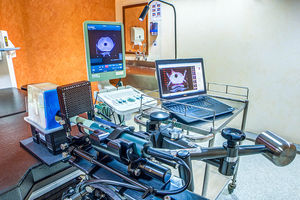
Families with a history of one type of cancer are at increased risk for other cancers.
When it comes to prostate cancer, genetics can play a significant role. For many people, the shock of a cancer diagnosis may reveal a deeper family history of the disease, leading to questions about who might be affected next.
Understanding the genetic risks of prostate cancer can help individuals and families take proactive steps to protect their health.
Dr Catherine Mutinda, a medical geneticist at Nairobi Hospital, says that there is a link between genetics and prostate cancer.
“Cancer cells are different from ordinary cells. They have the ability to create their environment, allowing them to survive and grow in ways healthy cells do not. Cancer cells can evade our immune system, which is supposed to decide what is good and remove what is bad in our bodies. Hence the reason why cancer is genetic,” Dr Mutinda explains.
Cancer is inherited in a dominant fashion.
“If you have a family history of prostate cancer, say from a grandparent, there’s a 50 percent chance of passing that risk to the next generation. Therefore, if you have four sons, two of them may carry that gene. It doesn’t skip generations, so understanding family history can be critical,” Dr Mutinda says.
Dr Mutinda says that in families with a genetic link to cancer, diagnoses often happen earlier in life when the person is young and the disease may be more aggressive. She adds that there are around 22 genes associated with prostate cancer risk.
How can you determine if your family carries a genetic risk for prostate cancer?
Dr Mutinda suggests starting with understanding your family history.
“You may learn at a funeral or family gathering that a relative had prostate cancer. This is often the first clue,” she says adding, “A cancer predisposition test is the sure way for a person to find out if they are predisposed to prostate cancer.”
“Once a patient comes for a consult, we first draw a family tree to establish whether there is any family member who had cancer.
Then we do the genetic test which is normally a blood test,” Dr Mutinda explains on how the test is usually done.
She notes that testing is best done when a person is not symptomatic to get a full risk profile. The test may reveal a genetic variation, such as in the BRCA gene, which could indicate the likelihood of developing certain cancers within a timeframe.
“If the patient has a cancer propensity gene, the results will come up and tell the name of the gene, the chances of you developing cancer and the time that you have. For instance, it can say, ‘You have a variation of the BRCA gene. There is a 60 percent chance of you developing breast cancer in the next five years.”
What next after testing positive?
If a genetic test reveals a predisposition to prostate cancer, the next step is to develop a plan.

Dr. Catherine Mutinda during an interview at Nation Centre in Nairobi on November 6, 2024.
“We work with patients to make proactive choices about their lives. For example, women at high risk of breast cancer may opt for a mastectomy after completing childbirth and breastfeeding, much like Angelina Jolie (a famous actor) did. For a man, you have to discuss with your urologist. ‘Do you want to remove this prostate now, or is it better for you to just do surveillance?’ Remember that the removal of your prostate does not mean that you cannot have children,” Dr Mutinda told Lifestyle.
For those who find out that they are not predisposed to any cancer, Dr Mutinda recommends that they be proactive about their health and just take annual checkups.
“A yearly exam could detect even subtle changes, and early intervention can make all the difference.”
Why does genetic testing matter to everyone? Although prostate cancer primarily affects men, Dr Mutinda points out that families with a history of one type of cancer are at increased risk for other cancers, too.
“Cancer is one disease that can affect different organs. For example, women coming from cancer families do not have prostates but may still be at risk for breast or ovarian cancer,” she explains.
For those with a family history, genetic testing is a practical way to prepare for the future.
“We use this information to help patients plan their lives. For instance, if you know you’re at risk of congenital blindness, then we can start discussing how you can start learning Braille or even consider a career change. For cancer, you might schedule regular screenings or consider lifestyle changes to protect yourself.”
According to Dr Catherine, genetic testing can cost between Sh30,000 and Sh100,000, depending on the facility and scope of testing.
However, Dr Mutinda cautions against relying on direct-to-consumer genetic tests. These are genetic tests that are sold directly to consumers to provide their genetic information.
“What happens is that you can buy a kit online put your saliva then send it back to the geneticists. They will check and tell you that your propensity to contract cancer is zero. Then, later on, you contract breast cancer. You see direct-consumer tests depend on populations. However, these tests often lack adequate representation of the African genome, so they may provide inaccurate risk assessments,” she warns.
Dr Catherine says that genetic test results can be released within a month.
“However, there are times when we have to fast-track the results to around 10 days. Why would I first track a result? Maybe if the patient is in an Intensive Care Unit and I need to get answers to the patient or the family so that they can make decisions on the treatment path.”
Dr Mutinda emphasizes the importance of pre and post-test counselling.
“Receiving genetic test results can be overwhelming, and patients may not know how to interpret the information. Counselling helps patients process the results responsibly, without causing unnecessary alarm among family members.”
A primary care physician can help individuals monitor and understand any changes to their health over time. Genetic testing is just one part of a comprehensive approach to healthcare. By understanding your genetic makeup, you can make more informed choices and take steps to protect your health and the health of future generations.










